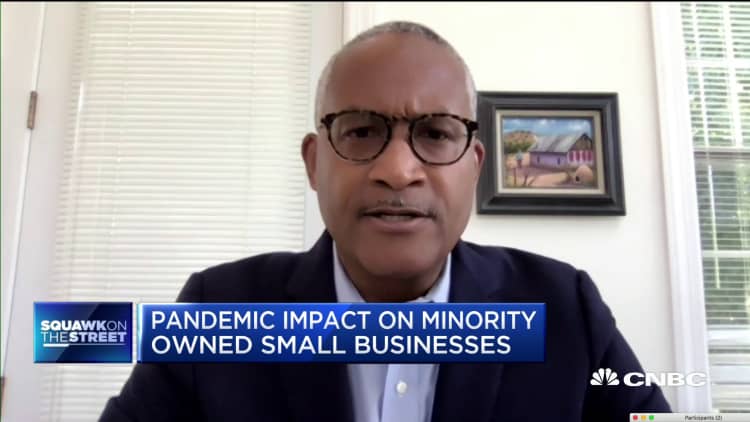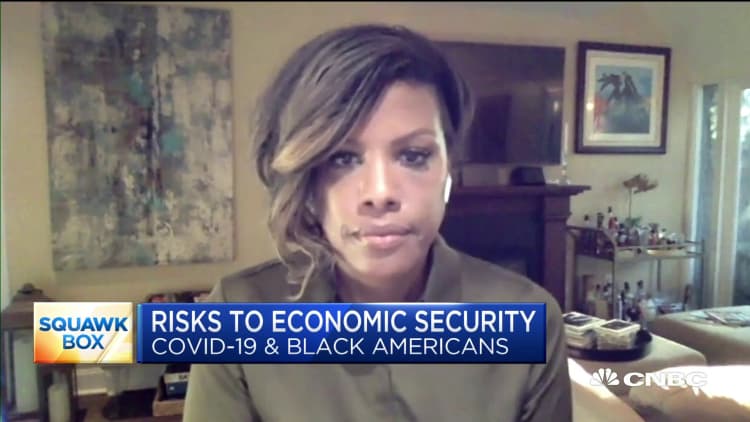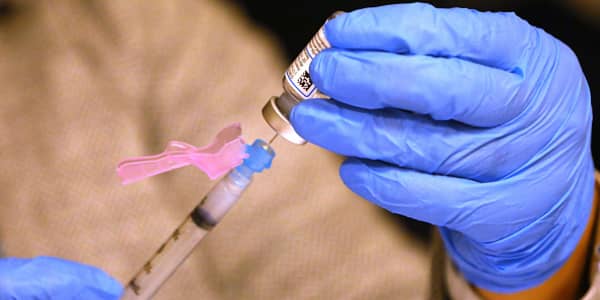
Black Americans have been hit disproportionately hard by the Covid-19 pandemic, and the White-led financial institutions that could theoretically offer economic support may simply not be enough. The coronavirus pandemic has exacerbated a crisis for Americans already facing poor economic and health outcomes, and highlights the lack of financial services institutions run by Black founders and executives.
Black and brown business owners have faced a disproportionate share of Covid-19 failures: from February to April of this year, there was a 41% decline in Black-owned businesses and a 32% drop in Latinx business owners. White entrepreneurs experienced only a 17% decline. Among those who applied for Paycheck Protection Program support, a report from Color of Change and Unidosus found that only 12% received the assistance they had requested. Forty-one percent received none.
"The lack of access to capital is the single highest driver for business failure, and Black founders are less likely to gain it," said Melissa Bradley, Georgetown McDonough School of Business Professor. "Access to capital is limited not because of demand, but due to pattern recognition by investors, different social capital based on educational and social choices (e.g. golf clubs), and a limited number of sponsors ... who can vouch and validate the entrepreneurs."
The funding gap
Entrepreneurs seeking initial funding typically turn to venture capitalists, traditional banking institutions, or community and personal wealth. Venture capital, the common route for tech-focused and some consumer start-ups, distribute a mere 3% of funding to Black founders, and of that, less than 1% goes to Black female founders. In other industries, a company's initial investments come from the founder's community, family, or bank.
In a 2018 report, the Small Business Association found that personal and family savings are the most common sources of financing for all entrepreneurs, and among Black and Latinx founders, the reliance on those funds is even higher. However, Black households' median net worth is about a tenth of that of White households. Black Americans are the U.S. demographic with the lowest median income, according to Brookings Institution's The Hamilton Project, and they display the highest Covid-19 mortality rate in the country, over twice that of Whites and Asian Americans. Black adults also have the highest likelihood of working in an essential, and low-paying, high-risk job.
While the national unemployment rate fell almost a full percentage point in July, Black unemployment remained virtually unchanged, at 14.6%, compared to White unemployment at 9.2%, Asian American unemployment at 12%, and the Hispanic jobless rate at 12.9%.
Some resources do exist to help close this funding gap, but as BLCK VC founder and Storm Ventures principal Frederik Groce points out, those avenues of funding only work if a founder has access to them. For Black founders, that access is limited.
Groce's BLCK VC functions as a Black venture capital resource group, connecting and supporting Black founders. Georgetown's Bradley co-founded Ureeka, which works to reduce costs and risks associated with building a small to medium-sized businesses, and Bradley's 1863 Ventures is a business development program for entrepreneurs of color. Despite these initiatives, Groce concedes, "These communities are often over-mentored and under-resourced."
That's where banks come in.

Black founders face financial institutions that have, as evidenced by the PPP distribution, contributed to the funding gap. Even when Black founders can secure access, the costs can be steeper than for their peers. The 2018 SBA report found that minority business enterprises typically experience higher interest rates and more loan denial than White businesses.
"The low approval rates and higher costs are based on bias in the inputs that decide credit-worthiness and repay net potential," Bradley said.
Entrepreneurs of color are more likely to avoid applying for loans due to fear of denial. And the risk of failure, even if a loan is secured, is magnified. "If you fail as a Black person with bank funding, the likelihood of you getting funding again is low," Groce said.
Black money and banking history
For Black founders, the first challenge is being banked, or in the least, having financial institutions in their communities. FDIC data shows that less than 46% of Black households were fully banked in 2017, versus over 77% for White households. Asian households are the second highest, and Hispanic households came just above 46%. Over 90% of financial institutions that closed during the financial crisis were in poor communities, according to Hope Credit Union CEO Bill Bynum, and based on statistics of race and economic status, those communities were likely to be communities of color.
The history of the financial services sector weighs heavily on today's conditions, Groce said. The underwriting models and racially blind financial systems used today may have been created with good intentions but ultimately don't help communities already underserved by banks.
"Just because your policy isn't racist, doesn't mean it's anti-racist, doesn't mean it doesn't build off of legacy that was racist," Groce said.
The White-led biggest banks in the U.S., like JPMorgan Chase, Bank of America and Wells Fargo, have over two centuries of history. Citi traces its roots back to the American Revolution, which it helped finance. As as each evolved through a series of mergers and acquisitions, growing into the banking behemoths we know today, their histories are ingrained into the American economy.
The lesser known history is that after the Civil War, Congress chartered the Freedman's Savings and Trust Company, originally led by White men but inspired by Frederick Douglass's understanding that formerly enslaved African Americans needed more than the 13th Amendment to participate fully in the U.S. economy. Not 10 years later, as its White-managed counterparts continued to grow, the Freedman's Bank closed, leaving Black America's first hopeful depositors with cumulative losses of $3 million, a modern equivalent of $66 million.
It's I think unrealistic to expect traditional banks to all of a sudden be responsive to the needs of communities they have neglected and failed to invest in previously.Bill BynumHope Credit Union CEO
It took 14 years after the Freedman's Bank's demise for African-Americans to trust another bank, Capital Savings Bank, based in Washington, D.C. It closed in 1902, but was followed by a string of others. Black-owned banks flourished in the 50s and 60s, but from 2001 to 2018, the number of Black-owned financial institutions declined over 50%. Today, that number is down another 9%, leaving only 21 Black-owned banks in the United States. Not one of those manages assets over $1 billion. The largest, OneUnited Bank, manages over $650 million. For comparison, Wells Fargo, Bank of America, and JPMorgan Chase each manage well over $1 trillion in assets.
For their part, the big banks have begun to leverage their assets in support of their Black-led counterparts. In May, Citi announced a partnership program with the National Banking Association to purchase up to $50 million in PPP loans from Minority-owned Depository Institutions (MDIs). In March, Wells Fargo also committed $50 million to supporting MDIs, an initiative that complements its five-year, $175 million Diverse Community Capital program. In 2019, JPMorgan Chase announced a mentorship program with two Black-owned banks: The Harbor Bank of Maryland and Liberty Bank. This year, in an effort to bolster support for entrepreneurs of color, JPMorgan announced its Advancing Black Pathways program plans to expand its Entrepreneurs of Color Fund.
These initiatives are important, though it will likely take more than a few years of work to undo the country's inequities in banking between Blacks and White Americans, experts concur.
"If you look at a map of where slaveholding was concentrated before the Civil War, and you overlay that with a map today ... of the worst education outcomes, worst health outcomes, worst access to banking services, they're the same places," said Bill Bynum, CEO of Hope Credit Union, one of the less than two dozen Black-owned credit unions in the U.S. "It is impossible to look at what's going on in the country today with the health crisis, the economic crisis, and the racial division, and not acknowledge the conditions that existed before," Bynum added
The loan denials, the wealth gap, the high rates of invisible credit history, the disproportionately high pandemic unemployment rate, and even the mortality rates and life expectancies for Black Americans are part of this legacy.
Part of the equation in the disproportionate number of Black loan denials, according to Groce, is a misunderstanding of the applicant's context. Relationships with banking officers could help Black entrepreneurs build capital and confidence.
When poverty nonprofit Robin Hood asked local business owners who they turn to first for banking support, CEO Wes Moore said, "It's not necessarily a big bank. It's not the JPMorgan or the Citigroup. It's going to be the Carver Bank. The small bank that they know." Robin Hood also runs the Power Fund for minority entrepreneurs.
Groce told CNBC, "I am floored by how a relationship can change sometimes the interest rate or the terms and conditions of money."
Understanding the history, while tedious, is crucial to building a sustainable, inclusive future. Hope Credit Union recently landed a $10 million deposit from Netflix, the first step in the streaming company's initiative to bank 2% of its holdings with Black-owned institutions.
Black-owned banks have less capital
After George Floyd's death sparked nationwide protests this year, conversations about racial and economic parity reverberated in boardrooms from Silicon Valley to Wall Street. In addition to Netflix, big banks announced a variety of initiatives to support Black-owned businesses, Black wealth creation, and even Black-owned banks. Bynum, while pleased with the support from corporate players like Netflix, questions how much the legacy banking players can truly offer Black America.
"It's I think unrealistic to expect traditional banks to all of a sudden be responsive to the needs of communities they have neglected and failed to invest in previously," he said.
Hope Credit Union and other Black-owned financial institutions have attempted to close the capital access gap for Black Americans and entrepreneurs, especially since the pandemic. Hope has issued 2,700 PPP loans so far, 80% of which were distributed to entrepreneurs of color.
Kevin Cohee, CEO of OneUnited Bank, the largest Black-owned bank in the U.S., said the bank's first PPP loan was to an Uber driver and mother. But he found when surveying his bank's PPP distribution that among the majority of people who needed PPP loans, most didn't have the resources or support to help them apply. The location of Black banks, often in rural, lower income areas, is key to raising the rates of Black unbanked or underbanked Americans and building Black wealth.
We have to do more with less.Kevin CoheeOneUnited Bank CEO
Part of why Black-owned banks are struggling to offer more financial support is their own lack of capitalization.
"Unfortunately, we are significantly undercapitalized compared to our peers," Bynum told CNBC.
The undercapitalization problem with these lenders is a cyclical one.
"You need capital to build more capital," wrote Mehrsa Baradaran in her book, "The Color of Money: Black Banks and the Racial Wealth Gap."
"We have to do more with less. ... It's challenging to have a customer base that's last hired, first fired," Cohee said of serving a lower-income client base.
Melissa Bradley, who worked as banking regulator at the Treasury Department under President Clinton, said the limited account capital also means Black-owned banks attract less institutional capital to support growth and market expansion. The comparatively small assets also limit their discretionary capital for technology and product and service origination, she said.
Banking technology and social activism
Fintech platforms can help.
For OneUnited, the internet is key to the bank's, and its community's, survival.
OneUnited Bank prides itself on prioritizing tech-enabled banking for its accounts. Although the FDIC-insured bank has branches across the country, Kevin Cohee told CNBC that most of its clients are online. Not only do gig economy and cash app integrations broaden OneUnited's appeal beyond the Black community and thus expand account capital potential, but a tech-focused strategy helps Cohee position his bank as a tool for activism.
Cohee says Black-owned banks offer more than just capital, and reinvestment of capital, to their communities. They offer leadership, education, and organization. OneUnited spearheaded the recent #BankBlack movement and continues to mobilize its community. "Black-owned banks are at the forefront of these pushes for change," he said.
Black financial leaders remain worried about the future for these institutions, especially as Covid-19 hits Black communities hard and the history shows how smaller financial institutions will fail during times of crisis.
"I worry about community banks right now, and Black-owned banks particularly," Groce said. "The economic landscape for Black communities in the U.S. directly impacts the success of the banks that serve them. If we're not careful ... they're going to continue to dwindle."
If the already limited number of Black-owned banks do fail, the impact on the U.S. economy would be significant.
1863 Ventures' Bradley noted the United States will soon be majority people of color.
If Black banks continue to close and legacy White-led banking players do not step up enough to support people of color, Groce says the wealth gap will continue to widen.
The undercapitalization of Black-owned banks is part of why Wes Moore praises Netflix's commitment of 2% of its holdings to Black-owned financial institutions. "The probability of that money being able to flow through the Black community is going to be much higher than what it would be through any other institution," he told CNBC.
But Moore admits these are only first steps. "The problem will be if we somehow stop there," he said.
Bradley also is encouraged by moves like the one Netflix made, but said, "There needs to be an infusion of public and private capital to overcome the structural barriers and then let them compete in the marketplace."
A broader shift in the corporate psychology needs to occur and support Black entrepreneurs and bankers. Corporations cannot effect enough change if they focus only on hiring more Black employees. "What are we doing to create more [Black] employers?" Moore asked.
OneUnited CEO Cohee said the best way for Americans to support Black wealth creation is simple: bank Black. Even if you're White.





